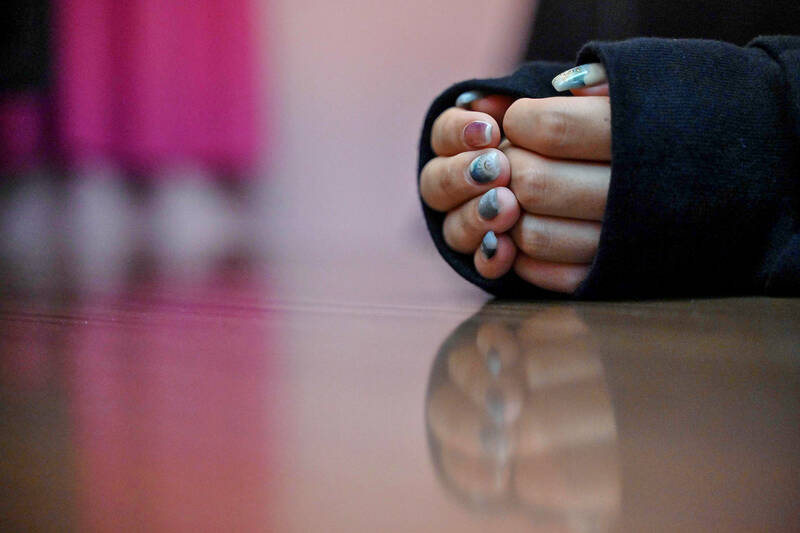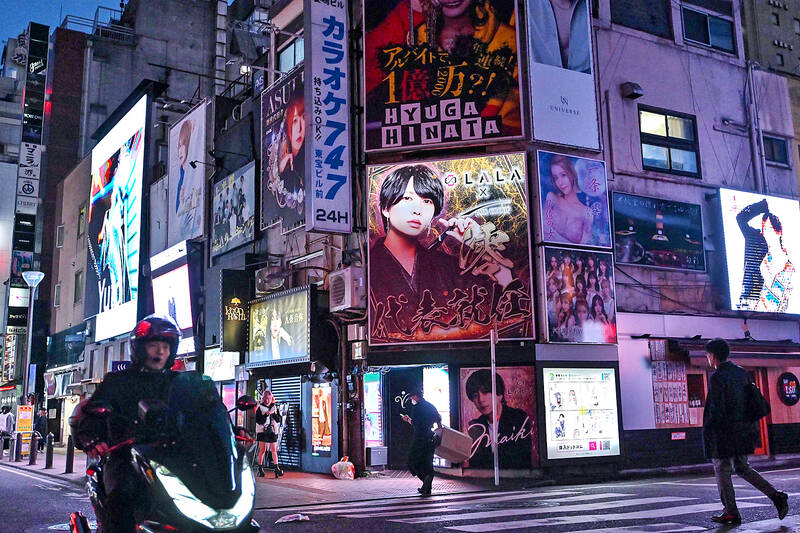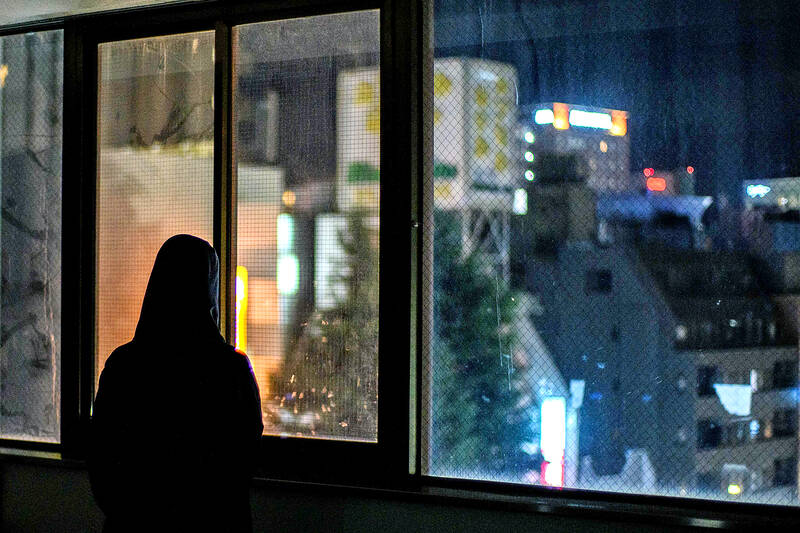Growing up, Mirai Kisaragi fled her abusive parents, survived homelessness and contemplated suicide. At 18, she met her “savior” at one of Tokyo’s hundreds of host clubs, where men entertain women.
Except he, too, was no good.
Before long, Kisaragi became one of a growing number of victims of financial and sexual exploitation linked to these establishments, which have dotted Japan’s red-light district Kabukicho for decades.

Photo: AFP
Just like in hostess clubs, where the clients are men, hosts spruced up with make-up and immaculate hairstyles regale female customers with sweet talk and expensive alcohol.
Lured by the promise of romance, women can find themselves tricked into abusive relationships, towering debt and even prostitution, activists say.
Kisaragi ended up in Kabukicho after running away from home at 14. There, she occasionally slept in emergency stairwells before she was sent to a care home. At 18, she met a “cool” attentive man who actually seemed to care — a host.

Photo: AFP
“Whenever I opened the door of the host club to see him, he would say ‘welcome home’ — something no one had ever said to me at home,” said Kisaragi, now 23.
But he installed her in one of Tokyo’s ubiquitous “net cafes,” where she was made to work as a prostitute, dispatched on demand.
He collected all her profits, and as she continued to visit the club, she piled up debts.

Photo: AFP
“What the host was really doing was to manage me as a prostitute. But I naively thought back then that he had given me a job and a smartphone on the spot,” she said.
“He looked like a saviour to me then.”
‘HUMAN TRAFFICKING’
Women like Kisaragi are drawn into clubs in different ways. Some are chatted up on Kabukicho’s streets, while others are persuaded by hosts they interact with on TikTok.
They can accumulate debts of hundreds of dollars a night ordering overpriced drinks, while hosts dangle everything from sex to assurances of love and marriage to manipulate them, activists say. Hosts sometimes even move in with women who are lonely or experiencing poverty and then browbeat them into sex work, in what resembles “domestic violence,” said Kazuna Kanajiri, head of Tokyo-based advocacy group PAPS.
“Young and poor women from single-parent families, for example, make the most lucrative targets for them,” she said.
Indebted women are sent to “scouts” to find jobs in the sex trade. The cash flow between hosts, scouts and sex businesses amounts to “straight-up human trafficking,” said Hidemori Gen, founder of a support group for parents. “’This woman must be worth 20 million yen’ (US$140,000). That’s the kind of thinking upon which host clubs exist,” he said.
Families have reported at least 250 cases to his group since July, an explosive rise from previous years that he attributes in part to the end of pandemic restrictions. Not all businesses are unscrupulous, and some say clients were already sex workers before getting entangled with hosts.
“I always warn girls about the price tag before they order drinks,” said Kabukicho host Saito, who only gave his last name. “So getting into debt is really their choice, but some still fail to pay, and I end up shouldering their debt,” the 27-year-old lamented.
‘I WANTED TO BE LOVED’
Still, the industry has begun soul-searching, with Prime Minister Fumio Kishida urging action and police conducting widespread raids on establishments. Host club operators in Kabukicho this month pledged to stop allowing clients to run up massive debts, and eradicate ties with the criminal underworld.
The industry “has undoubtedly been aware” of the problem, but “hasn’t taken it as seriously as we should have”, Takayuki Makita, head of major host club operator Group Dandy, told reporters last week.
“There is no way driving women into bankruptcy can ever be the right way for us to operate.”
Male customers can often incur massive bills at hostess clubs, but activists say they are not as vulnerable to the sexual exploitation for profit that women face with hosts.
One 20-year-old woman said she spent over 10 million yen (US$70,000) in two years on hosts, and ended up in sex work to pay down debts.
She was in institutional care from infancy, she said, with little memory of her parents.
“I wanted to be loved,” she said, speaking on condition of anonymity. “I thought that if my host hated me, life would no longer be worth living.” Now a member of PAPS, Kisaragi does outreach work in Kabukicho and sees her teenage self in many girls she encounters there.
“Kabukicho is a town where committing suicide can be treated as some kind of heroic act,” she says. “I’m talking to them thinking, ‘You don’t have to die’. I want them to live.”

Following the shock complete failure of all the recall votes against Chinese Nationalist Party (KMT) lawmakers on July 26, pan-blue supporters and the Chinese Communist Party (CCP) were giddy with victory. A notable exception was KMT Chairman Eric Chu (朱立倫), who knew better. At a press conference on July 29, he bowed deeply in gratitude to the voters and said the recalls were “not about which party won or lost, but were a great victory for the Taiwanese voters.” The entire recall process was a disaster for both the KMT and the Democratic Progressive Party (DPP). The only bright spot for

As last month dawned, the Democratic Progressive Party (DPP) was in a good position. The recall campaigns had strong momentum, polling showed many Chinese Nationalist Party (KMT) lawmakers at risk of recall and even the KMT was bracing for losing seats while facing a tsunami of voter fraud investigations. Polling pointed to some of the recalls being a lock for victory. Though in most districts the majority was against recalling their lawmaker, among voters “definitely” planning to vote, there were double-digit margins in favor of recall in at least five districts, with three districts near or above 20 percent in

From Godzilla’s fiery atomic breath to post-apocalyptic anime and harrowing depictions of radiation sickness, the influence of the nuclear bombings of Hiroshima and Nagasaki runs deep in Japanese popular culture. In the 80 years since the World War II attacks, stories of destruction and mutation have been fused with fears around natural disasters and, more recently, the Fukushima crisis. Classic manga and anime series Astro Boy is called “Mighty Atom” in Japanese, while city-leveling explosions loom large in other titles such as Akira, Neon Genesis Evangelion and Attack on Titan. “Living through tremendous pain” and overcoming trauma is a recurrent theme in Japan’s

The great number of islands that make up the Penghu archipelago make it a fascinating place to come back and explore again and again. On your next trip to Penghu, why not get off the beaten path and explore a lesser-traveled outlying island? Jibei Island (吉貝嶼) in Baisha Township (白沙鄉) is a popular destination for its long white sand beach and water activities. However, three other permanently inhabited islands in the township put a unique spin on the traditional Penghu charm, making them great destinations for the curious tourist: Yuanbeiyu (員貝嶼), Niaoyu (鳥嶼) and Dacangyu (大倉嶼). YUANBEIYU Citou Wharf (岐頭碼頭) connects the mainland